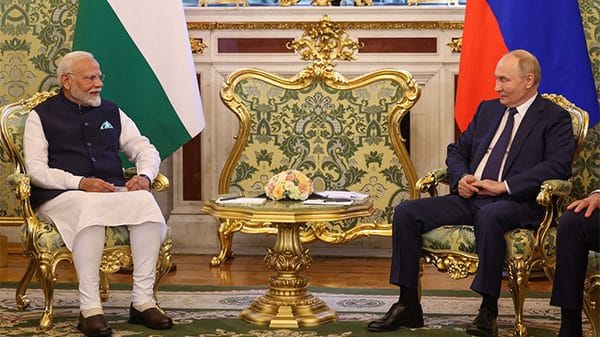The deepening alignment between China and Russia amid concerns about Moscow falling into Beijing’s orbit likely drove Prime Minister Narendra Modi to choose Russia for his first bilateral visit. The two-day trip resumed the India-Russia annual summit after a two-year hiatus.
The visit has sparked intense debate within the strategic circle of China, which is closely monitoring Modi’s trip. This scrutiny is not unexpected, given China’s significant interests at stake. Beijing relies heavily on Russia to counter the US-led Western coalition.
Various perspectives are being formed over Modi’s red-carpet treatment in Moscow and his balancing act between the West and Russia. Chinese commentators are assessing Modi’s visit as New Delhi’s strategic use of its ties with Moscow to balance its relationship with Beijing.
Also read: What do Chinese think of Beijing-Moscow partnership? Russia is both ‘comrade and problem’
Scrutiny on India and Russia
In China, there is a prevalent belief that India considers the northern neighbour its primary adversary, which influences New Delhi’s approach toward Russia as well as the West. India won’t completely sideline Russia while it will continue to cultivate relationships with major global powers. Chinese observers regard this strategy as a diplomatic tightrope through which the Modi government aims to position India as a neutral player capable of playing the role of a mediator in the Russia-Ukraine war.
Another critical perspective revolves around Russian President Vladimir Putin’s policy towards India since the beginning of his new term, which some perceive as somewhat indifferent. Putin prioritising China, North Korea, and Vietnam for visits after his reelection and shunning India and Modi until now are of great interest to Chinese commentators. This has led to speculation about a potential shift in Russia’s India policy. However, Putin’s apparent neglect, according to a commentary, does not necessarily signify abandonment but rather indicates a strategic move to exert pressure on Modi to choose between Russia and the US.
Liu Heping, a commentator for Shenzhen Satellite TV, said Russia’s India outreach is aimed at circumventing Western sanctions and diversifying its partnerships. Several commentators argue that Russia is not solely reliant on its partnership with China and is actively pursuing a robust ‘Look East’ strategy, evidenced by recent diplomatic engagements with North Korea and Vietnam, alongside hosting Modi. These efforts underscore Russia’s strategic engagement across the eastern Eurasian region.
On social media platforms like Weibo, there is a noticeable resentment toward the Western leaders for not criticising Modi’s Russia visit and his bilateral meeting with Putin. Many users perceive this as the West’s double standards. A prevalent sentiment questions why India can maintain business ties with both Europe and Russia simultaneously without much scrutiny, while China faces severe criticism for similar actions. There have also been calls for the US and Europe to impose sanctions on Indian companies for doing business with Russia.
Several posts on Chinese social media sought to know if Modi will face consequences for ‘playing both sides.’ In contrast, another post praised Modi as a ‘strategic master’ for managing to keep both Washington and Moscow happy. India has successfully nurtured friendly relations with major global powers while safeguarding its own national interests. The posts argue that Modi’s diplomatic finesse challenges traditional alliance system, emphasising that even ‘a smaller country like India’ can wield significant influence on the international stage.
However, there is a notable divergence between the discourse in Mandarin and English. In the English media and on X, there is an optimistic view of India-Russia relations. Scholars like Long Xingchun from Sichuan International Studies University and commentators such as Hu Xijin emphasised China does not perceive closer India-Russia relations as a direct threat. There is an attempt to portray India as a partner to both Russia and China, balancing against perceived ‘Western aggression’.
Also read: Beijing is now involved in new hotspot in South China Sea. ‘White-eyed wolf’ is the threat
Hoping for US-India rift
The timing of Modi’s visit to Russia, coinciding with the NATO summit in Washington, adds a layer of complexity. This could be seen as an opportunity for Beijing to misrepresent to the West that India is not as reliable a partner in countering China, while simultaneously signalling to India the potential for improving bilateral relations with China. The discourse and narrative shaping could also align with China’s strategic goal of using Russia to influence India to prioritise other areas over the border dispute.
The analysis of the discourse reveals China’s strategic calculus, where India’s outreach to Russia is viewed as a potential source of discord between India and the US. India is recognised as an effective counterbalance to China, both in Western perspectives and within Chinese strategic analysis. This implies that China would favour closer India-Russia relations if it strains India’s ties with the US. A deterioration in India-US relations would be more favourable and important to China than ensuring Russia’s tilt toward China and maintaining the state-client relationship with Russia.
Sana Hashmi is a fellow at Taiwan-Asia Exchange Foundation and George H. W. Bush Foundation for U.S.-China Relations. She tweets @sanahashmi1. Views are personal.
(Edited by Prashant)






